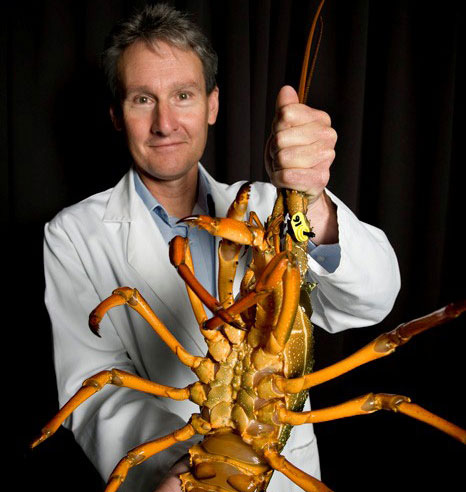World-leading tropical and temperate rock lobster research is giving Australia front-running at the cutting edge of aquaculture – and business is beating a path to the University of Tasmania's Taroona marine laboratories.
Operated by the Institute for Marine and Antarctic Studies (IMAS), the Taroona facility is the home of an internationally-recognised and funded study to mass produce lobster seed stock. This study has emerged from more than 15 years of research.
IMAS researchers have closed the life cycle of three species of rock lobster, successfully breeding from seed stock to a grow-out stage and eventual maturity and harvest.
The process has attracted a new $5 million funding agreement from the Australian Research Council to establish the ARC Research Hub for Commercial Development of Rock Lobster Culture Systems. The Hub's Director is Associate Professor Stephen Battaglene.

"This presents outstanding commercial opportunities for Australian companies in an international, multi-million dollar aquaculture venture squarely aimed at sustainable seafood production," said Professor Peter Rathjen, Vice-Chancellor at the University of Tasmania.
"The researchers have established the ability to produce a large-scale supply of seed for sea cage culture, and the process is being evaluated for the potential it offers wild stock enhancement in Australia," Professor Rathjen said.
He said the initiative has attracted State and Federal Government funding and Australian and US business backing to engineer the necessary prototype facilities and fund research in broodstock management, larval rearing systems, metamorphosis systems and optimum aquatic animal health.
An initial backer was one of the larger restaurant chains in the US, the Darden group, which first worked with researchers at Taroona in 2009. Through subsidiaries, the company owns and operates more than 1,500 restaurants, employs more than 150,000 people and serves 320 million meals a year.
Company senior vice-president, Mr Bill Herzig, said Darden has injected $3.7m into the Hub, believing that the research will "translate to a world-first in advanced sustainable food production that meets the higher quality and environmental standards".
"Following an extensive world-wide search Darden entered into an agreement with the University of Tasmania in 2009 to conduct research to develop a new technology to enable the commercial hatchery production of rock lobsters.
"Research undertaken at the University has focused on using both temperate and tropical lobster species and has delivered reliable platforms for advanced water treatment and management systems, lobster reproduction, larval rearing, and formulated feeds," Mr Herzig said.
Tasmanian companies, Plastic Fabrications and JSA Engineers, bridge the gap between research and development and commercialisation.
"This research is attracting global business opportunities, as well as prospects for new aquaculture industries in Australia beyond rock lobsters and into application of novel aquaculture systems to abalone, mud crabs, prawns and marine fish," Professor Rathjen said.
Project research partners are IMAS, Darden, JSA, Plastic Fabrications, The University of Auckland, NZ and the University of the Sunshine Coast.
The $5 million ARC Hub investment will provide six PhD positions at the University of Tasmania, which Professor Rathjen said will deliver expertise in an area where there are very few trained researchers in Australia. Another 20 researchers and support staff are already engaged in the project.
IMAS Director, Prof Mike Coffin, said wild rock lobster fisheries have been declining world-wide due to overfishing, habitat destruction, disease and climate change.
"World demand for seafood is growing rapidly and aquaculture is the only sustainable way to increase the production of such an important protein source.
"In Australia, aquaculture is expanding faster than any other primary production sector and farmed seafood has established itself as integral to the domestic Australian market for seafood," Prof Coffin said.
Associate Professor Battaglene (pictured) said the rock lobster research program had begun in 1998 with the local southern rock lobster. In that time, researchers had selected broodstock, mastered reproduction control, developed larval-rearing technology and nutrition. The system was then applied to the faster-growing tropical varieties.
"The next research challenge for the Taroona team will be how to scale up from the 'laboratory' to commercial production and to reach the position where re-seeding of wild fisheries becomes a practical option," he said.
Associate Professor Battaglene said the progress made in the project has only been possible with the long-standing support of the Fisheries Research and Development Corporation and previous grants from the Australian Research Council.